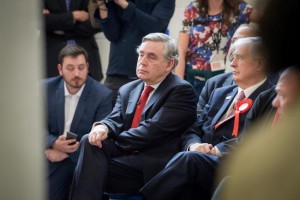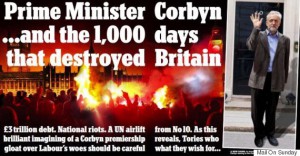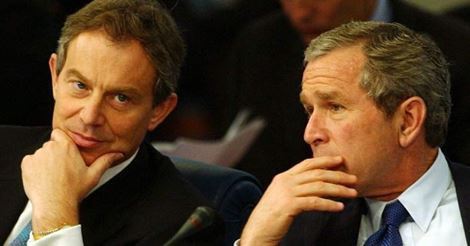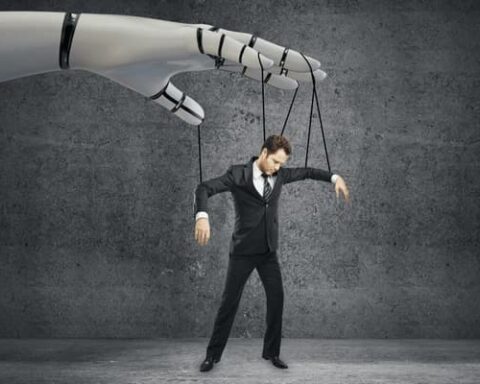It really is extraordinary how easy it is to convince people to vote against their own best interests over and over again. And then to wonder where it all went wrong.
Whether it’s in referendums or general elections, the combined forces of corporate-controlled media groups, paid-for politicians and manipulative social media campaigns have shown over and over again how effective they are at convincing the chickens to vote for the axe.
And not to merely vote for the axe, but to rabidly cheer for it and fight for it.
The Trump campaign in America was the prime example of this: with a millionaire scam artist and a cabal of anti-democratic 1% elitists managing to completely convince a vast amount of people that *they* were fighting for the little guy, the common man, and the interests of the working class.
In Britain, over a decade of Conservative government – and an accompanying policy of austerity crippling the most hard-up parts of society – and the Tories are still in power. After the mainstream media conducted a horrendous campaign against Gordon Brown in 2010 and paved the way for Tory government, the state of affairs in the UK has steadily and continually gone from bad to worse (and then from worse to you’ve-got-to-be-kidding-me): at least for everyone who isn’t sufficiently well off enough to be shielded from the effects of economic shocks.
The entirely Tory-created misadventure of ‘Brexit’ aside, the party of the British Establishment continued to find ways to reboot and hold on: after the predominately right-wing media managed to convince the British public that a mild-mannered social activist from Islington was the Anti Christ, the ongoing theater of the absurd culminated in an out-of-his-depth satirist named Boris Johnson becoming Prime Minister.
And now, as the majority of ordinary British people deal with price rises and a spiralling cost of living across the board and contemplate the eye-watering surge in energy bills, the Tories are more concerned with their internal Games of Thrones – as ambitious political careerists scramble to succeed Boris in yet another contest of Tory backstabbing and theater.
If this was France, there would be demonstrations on the streets – and demands for a snap election.
More importantly, while there’s probably very little that’s going to be done by the sitting government to spare struggling UK households the unreasonable financial strains and hardships (both present and looming), the British people actually had a chance back in 2019 to choose a different path to this one: but the majority of voters weren’t interested.
Let’s look at some basics, as they currently appear to stand.
British households are facing financial strains unprecedented in previous decades. General rises in food prices and common goods were tricky enough. But the October 2022 energy price cap is expected to rise by 82%. That’s insane.
And hardly any government minister can even manage to look like they’re concerned with anything other than internal politics and Brexit cred.
At the same time as British households are anxious about not being able to pay their bills (or having to drastically reduce things like food in order to save money), the major energy providers appear to be doing very well at the moment.
BP has reported profits of £6.9bn for the three months to June 2022 – this being right after household energy bills were forecast to rise to £3,420 later this year. That £6.9bn figure is apparently triple the profit from the same time last year.
Both Centrica and Shell are also reported to have achieved record profits for this time of year.
As Huffington Post reports, the UK’s other big energy suppliers are also in a good place. E.on in the first six months of the year made earnings of £245 million in the UK, up 77% on last year. EDF Energy of £728 million in the UK in the first six months of this year: a rise of more than 200% compared to the same time in 2021.
Open Democracy reports that ‘SSE made £600m alone in profit before taxes, according to annual accounts published by the energy regulator Ofgem. Last month, the Scottish energy company was forced to apologise for advising customers to “do star jumps” to keep their energy bills down…’
Energy analyst Cornwall Insight has forecast that household energy bills will rise further to £4,266 a year from January.
Even American media is reporting on the dire prospects for people in the UK. The End Fuel Poverty Coalition is predicting that 9.2 million UK households will be in ‘fuel poverty’ from October 1st, increasing to 10.5 million on January 1st. It says, bluntly: “A tsunami of fuel poverty will hit the country this winter…”
While the Blackadder-esque clown-show of the current Tory party doesn’t seem to give two shits about the pressures being put on ordinary British households, the main opposition party doesn’t seem to be rising to the challenge either.

It took a former Labour leader – one who was treated horribly by the British media in favour of David Cameron in 2010 – to come forward and address the crisis and offer options.
Gordon Brown proposed a temporary re-nationalisation of energy companies who failed or refused to cut bills for hard-up households. Brown suggested scrapping the energy price cap and renegotiating new lower prices with companies: adding that the government should consider bringing those companies into public ownership, at least “until the crisis is over”.
Let’s also note, shall we, that Brown’s suggestions at least partially echo the former Labour leader Jeremy Corbyn‘s plans.
In 2019, Corbyn (with remarkable prescience) was pledging to nationalise the big energy providers and to try to ensure fair and affordable bills for British households.
As reported in May 2019: ‘Labour will announce plans to seize back control of Britain’s energy network from private shareholders in an effort to fight climate change and end fuel poverty… Jeremy Corbyn and the shadow business secretary, Rebecca Long-Bailey, are expected to say that heat and electricity should be a human right for all and nationalisation of the network is key to decarbonising the economy…‘
Long-Bailey had also said that energy customers were being “ripped off” by the privatisation of the UK’s energy grid, with shareholders paid £13bn in dividends over the previous five years.
Under Corbyn’s plans, the energy companies were to be brought under the control of a new national energy agency tasked with ensuring every UK household can access affordable energy.
That was three years ago: and was a cornerstone of the Corbyn-era Labour Party campaign. Reasonable and affordable energy bills were framed as a *human right* in Corbyn’s plans.

Of course, the critical mass of the British public was, as usual, convinced by its masters to think of Corbyn as a ‘terrorist’ and a ‘national security threat’: and to continue to put their faith in the same Conservative government that had already been investigated by the UN for its policies towards disabled people and which, during its decade-plus in power has presided over the dramatic rise in British citizens needing to use food banks.
The Trussell Trust reported earlier this year that ‘Compared to this time five years ago, need for food banks in our network has increased by 81%‘.
Meanwhile the government is attempting to blame Russia’s invasion of Ukraine for this cost-of-living crisis: a tactic that has been dismissed by, for example, Martin Lewis, who argues ‘the rises in energy, heating oil, water, council tax, broadband and mobiles, food, National Insurance were all in place before Ukraine.’
The long era of ‘austerity’, slashing of funds for social welfare, removal of safety nets for vulnerable people (there were scores of deaths directly stemming from the Tories’ policies as far back as eight years ago), and the entirely-foreseen problems stemming from the no-deal Brexit that the Britain’s wealthy elites have been pushing for, have set up this state of affairs long in advance – the War in Ukraine is being used as a way to deflect accountability.
This is a government that doesn’t care about the common people. Any claims by this government that they didn’t see any of this coming (and that Russia is to blame for this cost-of-living crisis) are undermined by the fact, for example, that Corbyn clearly *did* see it coming and was setting up policies three years ago to deal with this eventuality.
All of this perfectly demonstrates the extent to which millionaire corporate interests – be they in the media, the energy companies, or the politicians servicing them – continue to exercise easy control of the majority of the population.
They actually managed to convince – easily – enough of the population in 2019 that BORIS JOHNSON (along with the likes of Pritti Patel and Liz Truss) was a better option than Jeremy Corbyn or the Labour Party. But then these are the same interests and people that managed to convince the majority of the most deprived areas in the North of England (which received most of its funding from Europe) to vote for Brexit.

Again – it’s remarkable how easy it is to get people to vote against their own interests.
Funnily enough, Labour itself – under Keir Starmer – was making it abundantly clear, right in the midst of the spiralling cost-of-living anxiety, that it was moving *away* from the Corbyn-era plans. At a time when average British citizens were worrying about the extraordinary bill rises and general financial hardship – precisely the things that Corbyn and co were addressing in 2019 – Starmer and his team announced (on July 25th) that they have no interest in such policies.
As was reported in July, ‘The party has abandoned pledges on nationalising rail, mail, water and energy companies, as they had promised under Mr Corbyn before the 2019 general election. Shadow chancellor Rachel Reeves insisted Labour’s 2019 manifesto no longer fitted with the party’s ‘fiscal rules’ and had been ‘scrapped’…’
It’s entirely possible the present Labour leadership took that position simply to distance itself from Corbyn and the perceived stigma. But Starmer and co also appear to be ignoring Gordon Brown too (a man who knows a thing or two about economics).
So both the government and the main opposition appear to be more interested in playing politics with this crisis rather than actively looking to solve it.
While all of this cost-of-living crisis is dominating headlines, Boris – still technically the Prime Minister – has been on two different vacations in a fortnight and appears to consider the whole thing someone else’s problem now that he has nothing to gain from caring anymore.
Don’t count on Liz Truss saving the day either.
Still, these are the people the British public have chosen to vote into power over and over again. And I wouldn’t be particularly shocked if the Conservatives still manage to win the next election too.
Meanwhile, things could potentially get a lot worse yet.
Bloomberg meanwhile suggests ‘The UK is facing a perfect storm of cold weather and gas shortages that could mean organised blackouts in January… Homes and businesses being asked by the government to curb their energy use is the latest sign the UK is being dragged into a 1970s-style malaise, alongside soaring inflation, political turmoil, economic uncertainty and industrial unrest…’
I mean, it’s possible that’s an overly grim forecast. But the way things appear to be going in this country the last few years, it isn’t excessive to suggest that people brace themselves for worst case scenarios.
Why Dickens’ A CHRISTMAS CAROL is Still So Relevant For Today…





What a goddamn minute. Since when were you watching GoT, from the beginning? Shame how that show fell off. I’m not inspired for this new reboot House of Dragons or whatever they’re selling.
Would there be? Didn’t they almost vote in that far right politician lady? Isn’t that an example of France with their own chickens voting for the axe?
And that’s just BP as one sole example, too.
I presume you know about Mick Lynch. What did you make of his claims regarding re-nationalisation not being possible had the UK remain within the EU? https://youtu.be/85cb4gKPpDs?t=103
What are your thoughts on, warm-banks?
Thanks for commenting. On the subject of France, yeah I think they’d absolutely be on the streets. Culturally, they seem to not accept or tolerate bad government or unfair hardships the same way we do in the UK. Do you remember the Yellow Vests protests in France – and how widespread they were and how long they went on for?
The thing about nationalisation and whether the EU would allow it is something I’ve seen raised – even by Corbyn I think. I don’t know. From what I understand, France has recently nationalised or partially nationalised some energy companies and the EU, I assume, wasn’t an impediment to that.
‘Warm Banks – I can guess what that means. And it wouldn’t surprise me one bit.
FYI, I still haven’t watched even a single episode of Games of Thrones yet. I’m beginning to doubt I’ll ever get started.